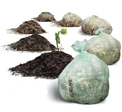 About Intelliplas Degradability
About Intelliplas Degradability Determining the performance of biodegradable plastics in landfill environments is conducted in laboratories using standardized tests that simulate landfill conditions. The primary tests for landfill biodegradation are the ASTM D5511 and ASTM D5526.
It is important to understand the limitations of each test and to avoid comparing results from different tests. For instance, a material that was tested using ASTM D 5511 showed full biodegradation occurring within 250 days, whereas the same material tested using ASTM D 5526 showed upwards of 5 years for full biodegradation. This is simply due to the environment of the test and not the overall performance of the material.
Intelliplas is made with components that show accelerated biodegradation in landfills and anaerobic digesters as validated by independent certified laboratories using ASTM International test methods (ASTM D5526 & ASTM D5511).
Independent 3rd party testing has shown up to 24.7% biodegradation within 160 days in optimized conditions. Actual rate of biodegradation will vary dependent upon environmental conditions and the biological activity of microorganisms surrounding the plastic. The customary disposal method of plastics is either recycling or landfill disposable, therefore the most applicable test methods would be for anaerobic (landfill) conditions. Intelliplas is produced with an additive which has enhanced plastics degradability under the scrutiny of the ASTM D5511 and ASTM D5526.
Intelliplas, unlike ASDM 6400 certified Compostable plastics or oxo-degradable plastics, will not break down in sunlight, or heat. It is not photodegradable so it will not degrade until it is in the ground. This eliminates the worry of shelf life of the bags or inventory. Intelliplas degrades. Unlike many other degradable films on the market, the degradation process is done both aerobically (with oxygen) and anaerobically (without oxygen). This is referred to as tanddegradable. Unlike many tanddegradable plastics on the market today, Intelliplas has no problems with high temperatures and leaves no toxic residues.
Intelliplas, with its unique components, meets the ASTM 5511 protocol for anaerobic degradation which is how garbage in our modern bioreactor landfills breaks down. "Compostable" plastics degrade aerobically and require air, heat, and moisture in order to successfully degrade. As a result, while they can degrade much quicker in a compost pile under ideal conditions, many of these materials can take many years to degrade in a landfills.
Important California Notice: California law prohibits the sale of plastic packaging and plastic products that are labeled with the terms biodegradable, degradable, decomposable, and any form of those terms, or imply in any way that the plastic will break down, biodegrade or decompose in a landfill or other environment. These restrictions apply to all sales in or into the state of California, including such sales over the internet.
Independent third party testing has shown up to 62.5% biodegradation in just under 7 months in landfill replicated testing (ASTM D5526). ASTM D5526 provides realistic results of biodegradation rates of the material in the typical conditions found in municipal landfills. This is a long term test that replicates the landfill environment of low heat, high pressure, limited oxygen, no light and low moisture. Results are typically much slower than those of the ASTM D5511, but also more accurate to landfill performance.

